2023 Spring / Summer
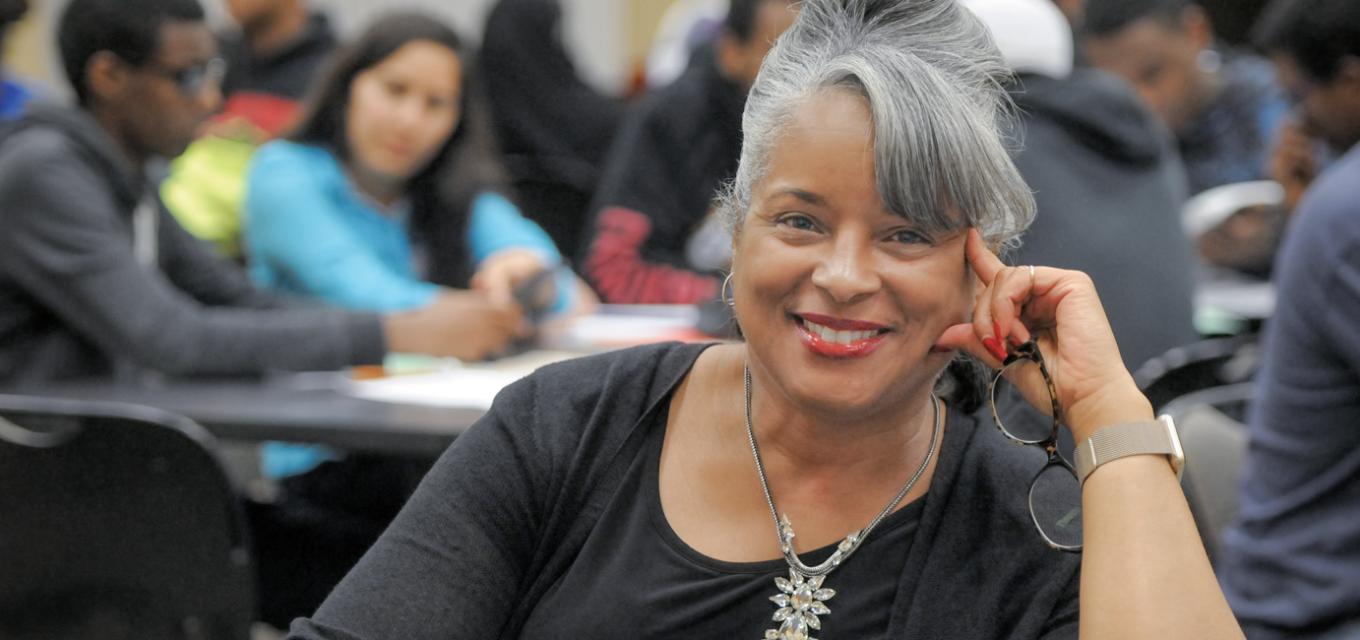
In support of equity and diversity
Faculty strive to embed inclusive initiatives throughout the Department of Curriculum and Instruction.
Recognizing the need to embed diversity and equality throughout its programming, the Department of Curriculum and Instruction (C&I) established a Race, Equity, and Justice Council (REJC) in 2019. The council was formed through the combination of two previous work groups: a diversity committee and a teachers of color council. REJC carries on the work of its predecessors while at the same time going deeper and broader in scope.
“The purpose of the council was to ground the work that we do in C&I in a way that is welcoming for every student,” says C&I Associate Professor Lesa Clarkson, who serves as the current facilitator of REJC. “The whole idea here was to make C&I a place that was reflected as valuing different cultures and different people and having it also reflect in the work that we do.”
Reclaiming language
A perfect illustration of REJC’s goal is the work Professor Mary Hermes has embarked on to keep alive the Ojibwe language. One of these projects is an early childhood education program in collaboration with the Institute of Child Development (ICD) and several tribal colleges in the state.
The idea came about from conversations with Dean Michael C. Rodriguez, Hermes says. “Michael was asking me how we can support Indigenous people,” she says. “We should do language, as there is a booming language revitalization movement.”
The program is in the early stages of planning but would provide tribal college students with advanced training in early childhood education, including Indigenous cultural perspectives. They would earn a BS in Early Childhood through ICD, as well as have an opportunity to take Ojibwe language classes. The program would be aimed at students who already have an associate’s degree from a tribal college to continue their studies and receive a bachelor’s degree.
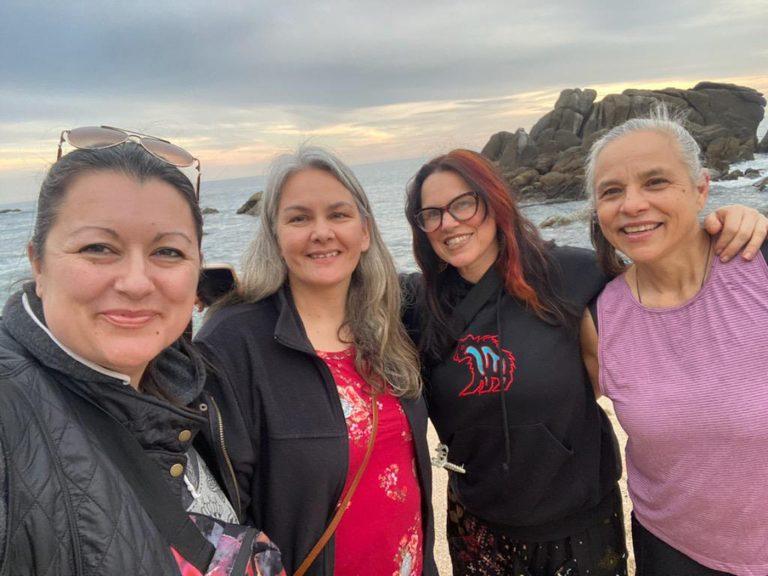
“The target audience is a lot of the Head Start teachers who are community people who do not have a BA and want to be language activists,” Hermes says. “If we can do this, we can make an army of teachers who can speak Ojibwe and we would have a movement. When kids are small, it is the best time to speak to them in Ojibwe. And it’s much easier than to start a full-blown immersion school. That’s a ton of effort and you reach a smaller percentage of people.”
As Hermes and colleagues were meeting with tribal colleges about the early childhood program, they heard from a few individuals that they would like to work with the U of M to get a PhD. From this simple ask came the Ojibwe PhD cohort. “Five Ojibwe women—and a sixth is likely joining—who are all educational and Ojibwe language leaders, began a special PhD program with me last fall,” Hermes says.
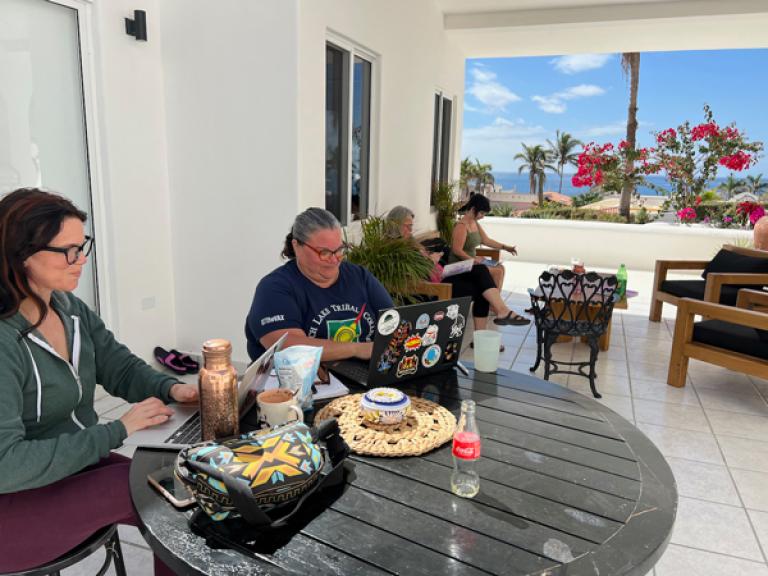
The cohort uses existing CEHD program structures and courses, so it was able to be up and running in a short amount of time. And the students love it. “This is a super special group of women 20 years involved in language activism,” Hermes says. “They are leaders in their community, they are language superstars.”
The students plan to use their PhDs back in their home communities, possibly working at tribal colleges in creating master’s programs. “A couple of them want to start grass-roots community efforts to start something that is language based, which could be an after-school program or a charter school,” Hermes says. “Educational language for young people.”
A third language project Hermes is involved in doesn’t yet have an official name, but it is being described as games for Indigenous languages. Located on the first floor of Peik Hall, the initiative has so far amassed $1 million in bids and grants. An innovative product presently being developed is Reclaim!, a point-and-click adventure video game in the Ojibwe language. The game is designed to give learners a fun and engaging way to develop their competence and confidence in using a new language. The project boasts eight Indigenous developers, writers, and artists. “That is huge,” Hermes says. “I feel super proud of that.” Hermes says she hopes the game will find broad appeal in both schools and homes.
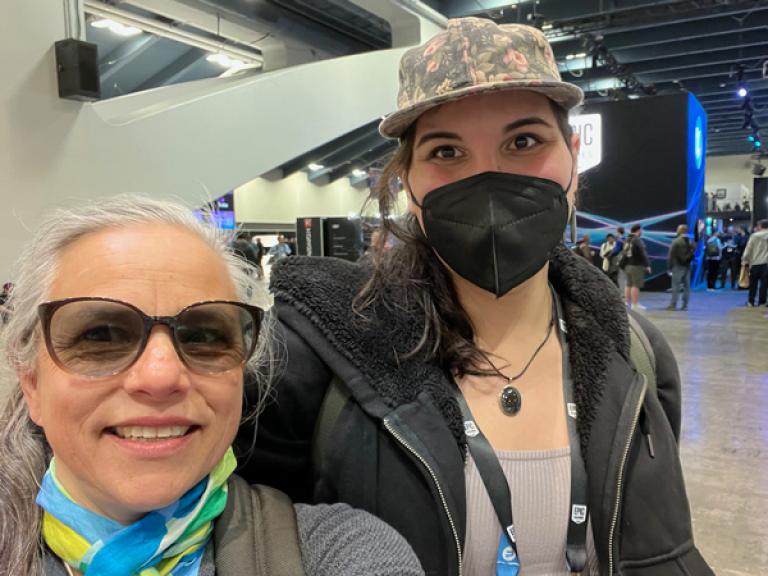
Normalizing experiences
An important aspect of REJC is for the C&I community to learn more about each other. “Upon looking at some of the experiences of people in the department—students, staff, or faculty—we found it wasn’t always the same set of experiences,” Clarkson says. “We wanted to normalize what these experiences should be.” Examples abound of inclusive initiatives within C&I which demonstrate this desire:
Racial justice in urban schooling
This significant curricular effort supports students’ exploration of their interest in graduate studies in education or activism on educational issues. This undergraduate minor is designed for students interested in how race, social class, language status, gender, or sexual orientation impact educational equity and social justice. Whether or not they want to become a classroom teacher, students who are deeply interested in education as a social issue find this major intriguing. Currently, C&I is working to deepen and make more explicit how the minor’s courses explore and examine the intersections of social class and race.
Directrack to teaching
This program gives undergraduate students early exposure to the culture of teaching and schools through in-school experiences and prepares them to enter MEd and teaching license programs. The program especially encourages applications from those who are racially or ethnically diverse, multilingual, and have an interest in teaching for social justice to meet the diverse needs of today’s students. The program is also currently facilitating affinity groups for aspiring teachers who identify as BIPOC and/or LGBTQ+.
Teacher Scholars of Color (TSOC)
Many teachers in the Twin Cities and surrounding areas do not reflect the racial and ethnic makeup of their students. It is C&I’s position that young people should have more teachers who look like them, especially when those teachers also have the knowledge and expertise to build on the cultures and identities of their students to promote academic success. TSOC is open to all teacher candidates of color in the teacher licensure programs and provides mentorship, support, and advice among its many impactful offerings.
REJC talk series
This series of informative and engaging seminars crosses program areas. Recent events included Associate Professor Keith Mayes of the Department of African American and African Studies speaking on “Disability Rights and the Invention of Black Special Education,” doctoral student Bisola Wald sharing “How Your Background and Experiences Can Advance Racial Equity Work,” and a panel discussion on “Innovative Anti-Racist Educational Policies and Practices for a More Just Tomorrow” featuring Assistant Professor Ramon Vasquez from C&I and Assistant Professors Nathaniel (Nate) Stewart, Meixi, and Darrius Stanley from the Department of Organizational Leadership, Policy, and Development.
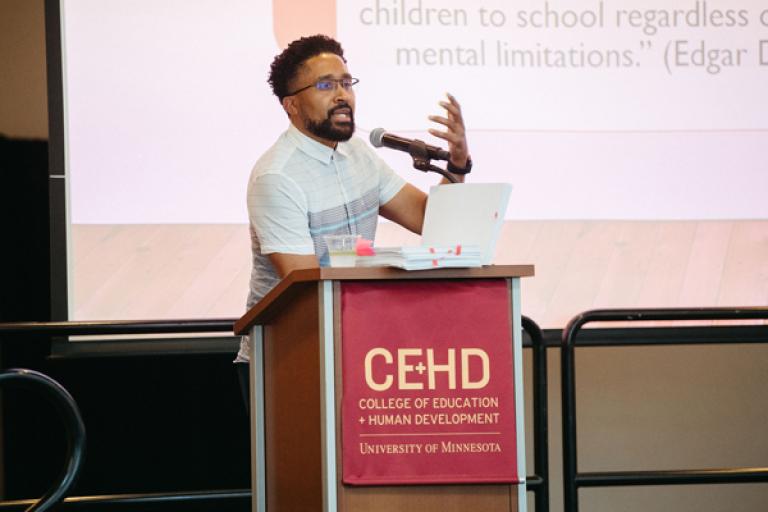
Black Students and Special Education: From disability rights to disability justice. Photo credit: Jayme Halbritt
Interdisciplinary unit plan
In Senior Lecturer Cynthia Zwicky’s Introduction to Elementary Teaching course, she has helped students create culturally relevant interdisciplinary unit plans that teaches the Elementary Education majors to consider all students’ learning modalities and ways of engaging their own students in the learning process. “They create meaningful lessons that diverge 180 degrees from a passive and worksheet-heavy style to one that can showcase multiple assets of how children learn and produce knowledge,” she says. “In this way they foster inclusivity as they learn to build classroom communities that are welcoming to all children.”
Reading and discussion the article ‘does race matter?’
This article, by Danny Martin of the University of Illinois, is being used by an instructor with elementary ILP students on the first day. The article has a quiz related to achievement gap and ways that teachers should think about this idea. “I have noticed how in-service and preservice teachers alike use the language of ‘high’ students and ‘low’ students and how hurtful this is to teach all students,” the instructor says. “I have noticed a documented change in the ways that my students are not using deficit language to describe their students.”
Professional development workshops
An instructor created two new three-hour professional development workshops for cooperating teachers who work with BIPOC teacher candidates as they student teach. “Between the two sessions, we have had roughly 30 cooperating teachers and faculty attend. Conversations were rich and valuable,” the instructor says.
Seminars
A new topical seminar was created that takes up the intersections of race, culture, gender, and nation. It has been very successful and has drawn diverse students from both within and beyond C&I.
Name change
Second Language Education is in the process of changing to Multilingual Education to recognize and reflect multilingual, multicultural reality.
BAFA BAFA
Students learn a “culture” rooted in playing a card game. One culture is more materialist and the other is more relational, and each has rules of language and behavior. Once groups have learned their “culture,” a series of cross-cultural interactions are staged to simulate the kind of misunderstandings that can arise in intercultural encounters. There’s also a significant debrief involved.
Who are we?
In one course, identity categories are posted around the room, such as language background, race, gender, nationality, and ability/disability, and students write how they identify on Post-Its. Then students are prompted to go to a category based on prompts, such as the one that gives a person the most privilege, or the one that most impacts teaching. Debrief is largely student-directed but usually focuses on feelings associated with being asked to identify oneself in these ways, visibility/invisibility of identities, intersectionality, representation, and how the community can make space for voices that are not well represented.
Onward and forward
This small selection is by no means exhaustive or can be considered finished. “Our work is ongoing and forward-looking,” Clarkson says. “I think we are forging a path for everybody. We did not just get here—these are years’ worth of energy and effort, and the work is not done. But it is beginning to develop momentum.”
-KEVIN MOE